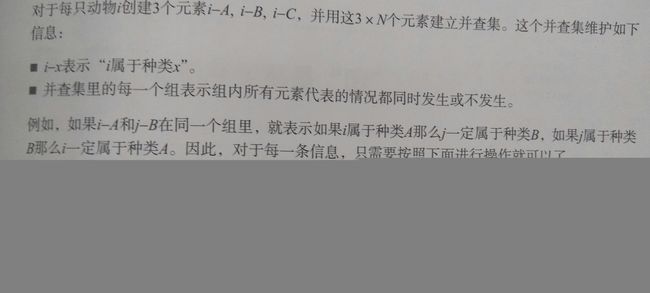POJ1182 - 食物链(带权并查集)
题目链接:
http://poj.org/problem?id=1182
题目大意:
动物王国中有三类动物A,B,C,这三类动物的食物链构成了有趣的环形。A吃B, B吃C,C吃A。
现有N个动物,以1-N编号。每个动物都是A,B,C中的一种,但是我们并不知道它到底是哪一种。
有人用两种说法对这N个动物所构成的食物链关系进行描述:
第一种说法是”1 X Y”,表示X和Y是同类。
第二种说法是”2 X Y”,表示X吃Y。
此人对N个动物,用上述两种说法,一句接一句地说出K句话,这K句话有的是真的,有的是假的。当一句话满足下列三条之一时,这句话就是假话,否则就是真话。
1) 当前的话与前面的某些真的话冲突,就是假话;
2) 当前的话中X或Y比N大,就是假话;
3) 当前的话表示X吃X,就是假话。
你的任务是根据给定的N(1 <= N <= 50,000)和K句话(0 <= K <= 100,000),输出假话的总数。
解题过程:
这题主要是看的书和博客,之前没接触过带权并查集。
题目分析:
这题用两种做法做了下,一种是挑战程序设计竞赛中的,另一种是搜的博客上面的。
首先说下简单粗暴的第一种方法:
一:
二:
对于每个节点有一个 Rank数组表示权值,这里引用两个blog好了:
http://blog.csdn.net/qq_24451605/article/details/46876121
http://blog.csdn.net/c0de4fun/article/details/7318642/
AC代码一:
#includeAC代码二:
#include